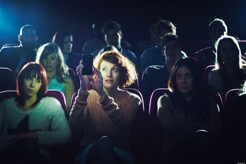Another Obnoxious Use for Cellphones: Smartphone Use in Movie Theatres
14 01, 15 09:04 Filed in: cellphone unintended consequence | cellphones and harmony
Several times in the past we have discussed the Don Norman essay entitled “Minimizing the annoyance of the mobile phone: The Annoyance, Irritation, and Frustration of The Mobile Phone -- A Design Challenge”. This is a summary of a longer report that is not in the public domain and was commissioned by Motorola in 2005. (At the time Motorola was a dominant player in both cell phones and cellular base station technology as well as a major CTIA member.) The report warns, “We are in real danger of a consumer backlash against annoying technologies.”
 The cellular industry today has many positive features and benefits for both our society and economy. But they continue to be tone deaf to any negative results of their amazing successful and near ubiquitous services. In today’s Washington Post John Kelly writes about a new example of an unintended consequence of today’s CMRS technology:
The cellular industry today has many positive features and benefits for both our society and economy. But they continue to be tone deaf to any negative results of their amazing successful and near ubiquitous services. In today’s Washington Post John Kelly writes about a new example of an unintended consequence of today’s CMRS technology:
Of course, this is not the first time this problem has been recognized in the blogosphere: National Review, Screen Rant, Today Show. There is even a post in the Houston Press blog advocating more cell phone use in theaters - another reason not to move to Ted Cruz ’s and Rick Perry’s Texas where the theatre patron next to you may well also be armed.
While the cellular industry demands the focused attention of the spectrum policy community on their ever growing spectrum needs, where do they stand on this issue? I can find nothing relevant on CTIA’s voluminous website. Indeed, the industry is silent on many unintended impacts of their technology except to occasionally deny them.
But why can’t the cell industry both ask for more spectrum and try to clean up some of the problems it has created? Maybe the solution is technical, maybe it is better user education, but why not at least try and heed the advice of the Don Norman report?

Textual healing
Roger from Great Falls, Va., said that a new year is a good time to remind people not to look at their cellphones during movies. “Taped requests prior to the movie are useless since the offenders already have their faces buried in their screens at the time,” he wrote. “A crowded theater looks like a flock of fireflies just from the LED lights, as emails are checked throughout the movie.”
Sure, Roger, I’ll mention it, but I don’t think it will do much good.
I’ve written about this in the past. Back then, I didn’t think theaters were quick enough to add admonitions against cellphones before the movie started. To their credit, they finally did. Then there was a period when people seemed to sort of get that it was rude to text during a movie.
But now we’ve emerged out the other end, into a time when cellphones are so ubiquitous that half the people who look at them during movies probably aren’t even aware of it. People don’t stop texting when they’re hurtling down the interstate. Why would they stop when in a movie theater?
Roger wrote: “I’d bet that a theater that can block signals would be a big draw. Heck I’d pay a premium for that. In the meantime it looks like Redbox is the only option.”
Theater owners hate to hear that. But they don’t seem willing to invest in the bodies that would stop texting, like an usher at the back of each auditorium looking for cellphone scofflaws.
My only suggestion is to patronize theaters unlikely to attract texters. I think I’ve seen a cellphone out at the AFI Silver only once. The Landmark cinemas on E Street and in Bethesda are great because their auditoriums are underground, unable to be penetrated by cellphone signals.
Of course, they tend to show small, independent films, so if you want to see a blockbuster you may have to sit in the front row, where you’re sure to have only one glowing screen in front of you.
Of course, this is not the first time this problem has been recognized in the blogosphere: National Review, Screen Rant, Today Show. There is even a post in the Houston Press blog advocating more cell phone use in theaters - another reason not to move to Ted Cruz ’s and Rick Perry’s Texas where the theatre patron next to you may well also be armed.
While the cellular industry demands the focused attention of the spectrum policy community on their ever growing spectrum needs, where do they stand on this issue? I can find nothing relevant on CTIA’s voluminous website. Indeed, the industry is silent on many unintended impacts of their technology except to occasionally deny them.
But why can’t the cell industry both ask for more spectrum and try to clean up some of the problems it has created? Maybe the solution is technical, maybe it is better user education, but why not at least try and heed the advice of the Don Norman report?
blog comments powered by Disqus



![Validate my RSS feed [Valid RSS]](valid-rss-rogers.png)

